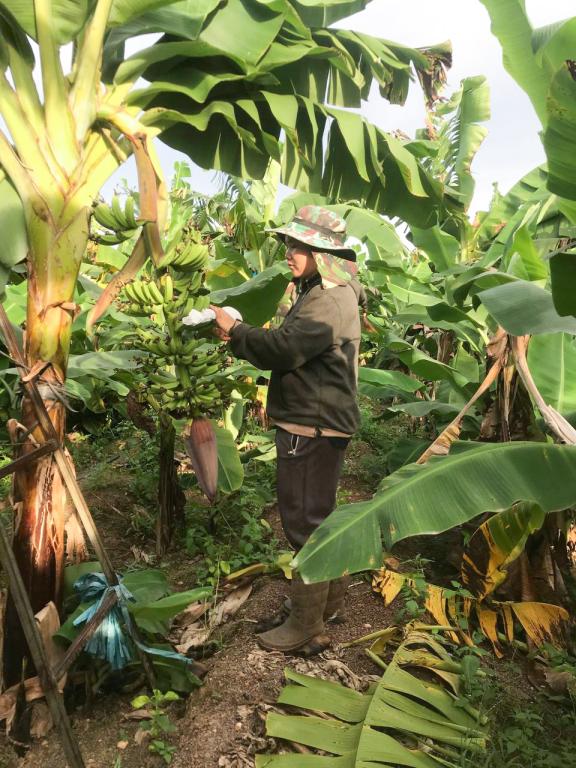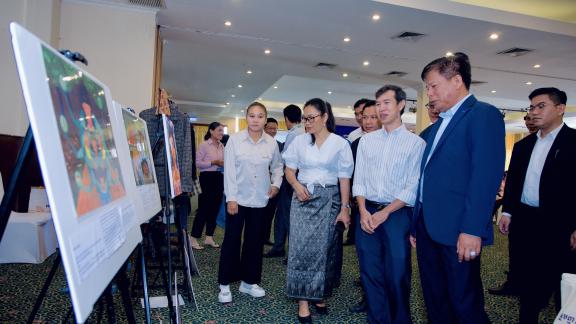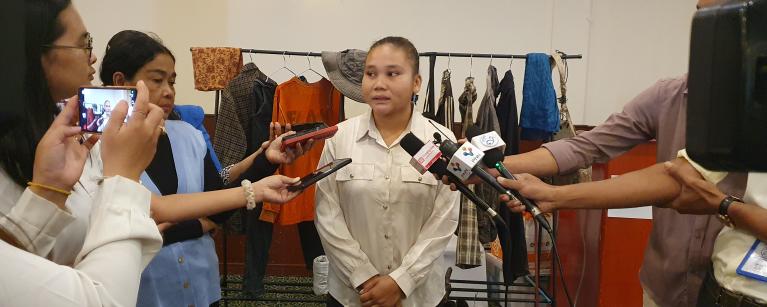““We need protective materials, NSSF cards, proper toilets, and legal worker registration””
Sreypov’s day starts at 6:25am and ends at 4:20pm, with a one-hour lunch break. Women earn 28,000 riels ($7) daily, while men, who finish 20 minutes earlier, earn 33,000 riels ($8.25). Despite her hard work, Sreypov struggles to make ends meet, spending 20,000 riels ($5) on food and 5,000 riels ($1.25) on protective materials such as mask, spray box, raincoat, boots and gloves.
Living with her parents in a company-provided house just five minutes from work, Sreypov’s father also works at the same company. Both have been employed there since 2019. As non-legal workers, they face job insecurity, with work available only when needed.
Safety is another concern for Sreypov. “I have to walk about 30 meters to find a suitable place to pee. I always go with a co-worker because I’m afraid of the drug addicts in the area,” she said.

Sreypov Thel while working in the banana farm. Photo supplied.
Sreypov’s story highlights the broader challenges faced by workers in the banana and rubber supply chains. During a national dialogue on October 31, 2024, in Phnom Penh on “Better Protection for Workers in Rubber and Banana Value Chains“, Oxfam National Director Ms. Sophoan Phean emphasized the limited access to social protection schemes like the National Social Security Fund (NSSF) and the inadequate living and working conditions in remote areas.
Workers in the banana and rubber industries face significant challenges due to limited access to information and participation. Often located in remote areas with poor communication and travel conditions, their work involved constant movement, making it difficult to monitor their activities.
The use of agricultural chemicals and fertilizers poses health and environmental risks, potentially leading to occupational diseases if proper protective gear is not provided. Companies must supply appropriate clothing and equipment to safeguard workers.
The dialogue, co-organized by Oxfam and FAIR for ALL partners, celebrated achievements and showcased best practices from key stakeholders in government and the private sector. It also facilitated discussions to find collaborative solutions for ongoing challenges. The event saw participation from around 130 representatives from various sectors.
Cambodia’s rubber exports have seen significant growth, reaching $229 million in the first half of 2024, a 19.83% increase from the same period in 2023. However, banana exports have declined by over 20% due to climate change, earning over $96 million in the first seven months of 2024.

Front row from right: Deputy Director General of the General Department of the Ministry of Labor and Vocational Training Savuth Khieu, Oxfam Program Manager Khim Sok, Oxfam National Director Sophoan Phean and Srey Pov Thel during the gallery walk, viewing illustrations of challenges faced by workers in the banana and rubber value chains. This was during a national dialogue on “Better Protection for Workers in Rubber and Banana Value Chains,“ October 31, 2024, Phnom Penh. Photo: Oxfam
The primary banana-growing provinces include Ratanakiri, Kratie, Stung Treng, Kampot, Kampong Cham, and Kampong Speu, with a slight increase in harvested land expected in 2023.
Oxfam and our partners are committed to collaborating with the Royal Government of Cambodia and other stakeholders to promote, monitor and provide feedback on the promotion of fair work, social protection and gender equality in the agro-industry, banana and rubber sectors. The commitment extends to both industrial-scale operations and small-holder farmers.
